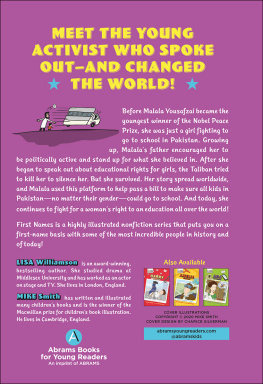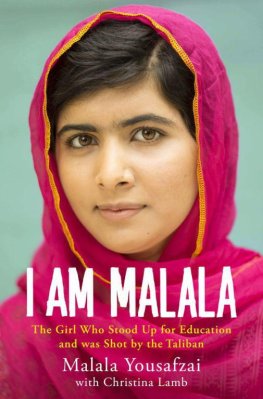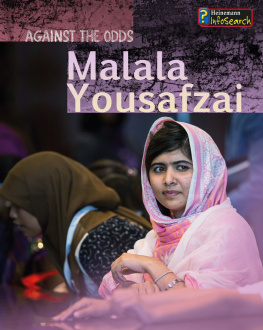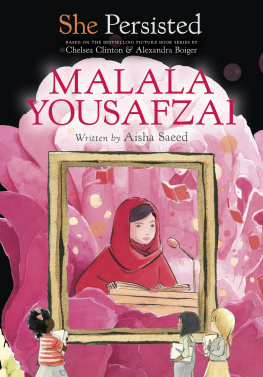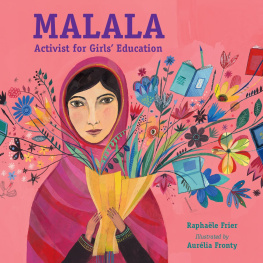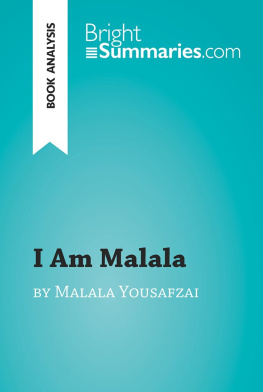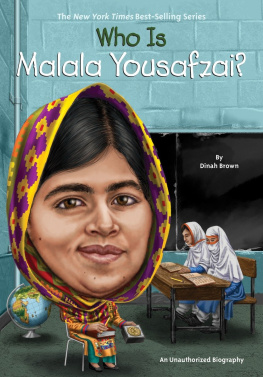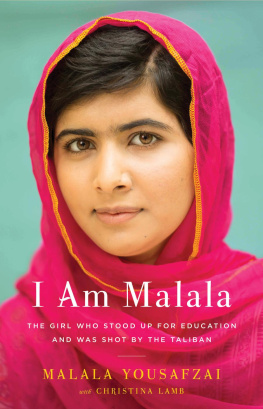Contents
Landmarks
Page List
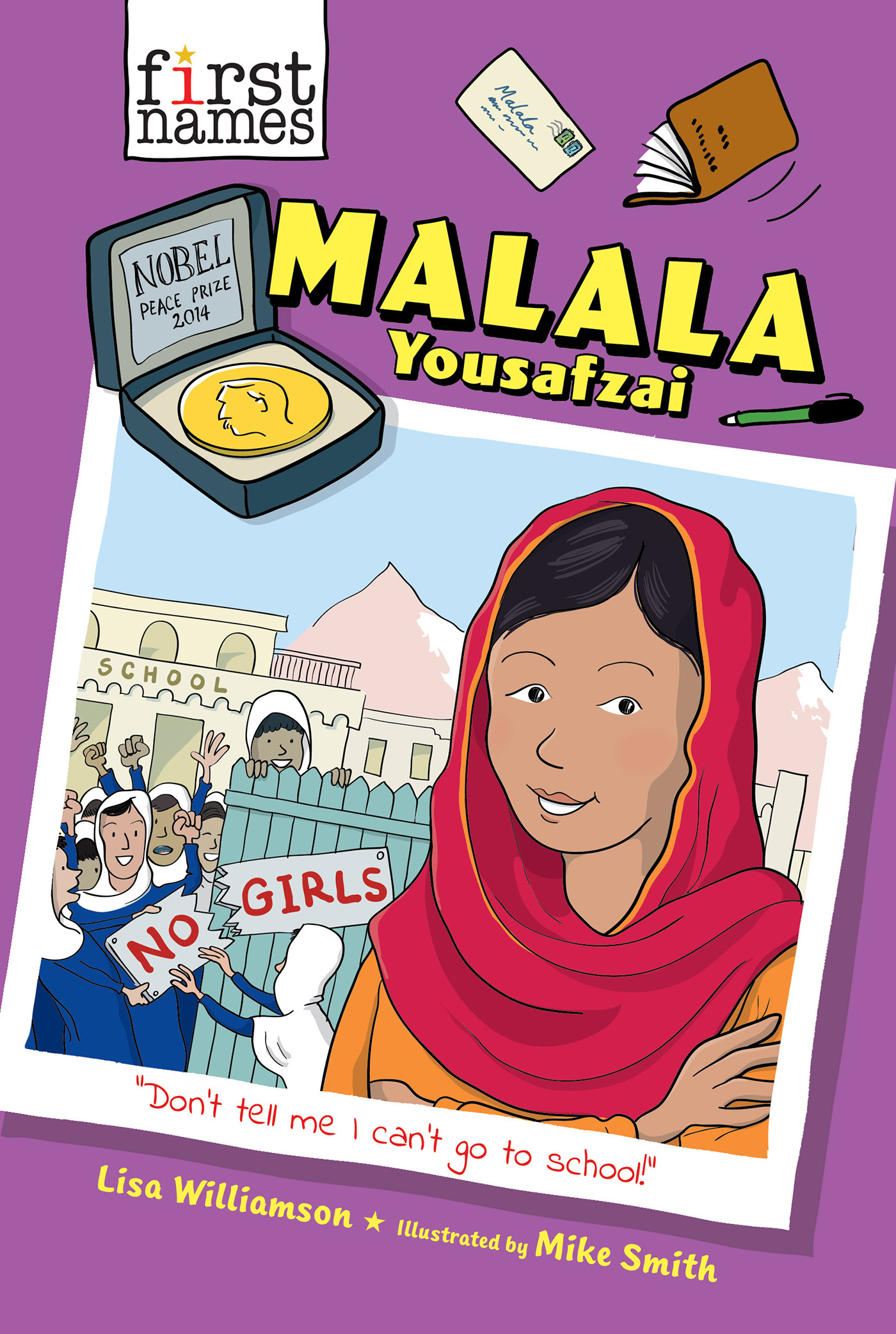

All the facts in First Names: Malala Yousafzai have been carefully checked and are accurate to the best of our knowledge. Many of the stories rely on peoples memories and news reports, and sometimes its impossible to separate the truth from the legend, but we have brought Malala to life as faithfully as we can. Some of the passages in this book are actual quotes from Malala and other important people. Youll be able to tell which ones they are by the style of the type: One child, one teacher, one book, and one pen can change the world.
Library of Congress Control Number 2019947600
ISBN 978-1-4197-4074-9
eISBN 978-1-68335-812-1
Text copyright 2020 Lisa Williamson
Illustrations copyright 2020 Mike Smith
Book design by Charice Silverman
2019 as U.K. edition. First published in 2019
by David Fickling Books Limited
Published under license from David Fickling Books Limited. Published in 2020 by Abrams Books for Young Readers, an imprint of ABRAMS. All rights reserved. No portion of this book may be reproduced, stored in a retrieval system, or transmitted in any form or by any means, mechanical, electronic, photocopying, recording, or otherwise, without written permission from the publisher.
Abrams Books for Young Readers are available at special discounts when purchased in quantity for premiums and promotions as well as fundraising or educational use. Special editions can also be created to specification. For details, contact specialsales@abramsbooks.com or the address below.
Abrams is a registered trademark of Harry N. Abrams, Inc.

ABRAMS The Art of Books
195 Broadway, New York, NY 10007
abramsbooks.com
C ONTENTS

I NTRODUCTION
October 9, 2012
Mingora, Swat Valley, Pakistan
Malala was in a good mood traveling home from school. She was pretty sure shed aced the test that morning and was looking forward to a relaxing afternoon at home.
She was laughing with her best friend, Moniba, when the school bus stopped suddenly. A young man was standing in the road. He wore long white robes and a baseball cap.
Is this the Khushal School bus? he asked.
Another young man jumped onto the back of the bus. A hush fell over the girls as both men glared at them. Heart hammering in her chest, Malala found Monibas hand and gave it a squeeze. Around twenty girls were crammed onto the hard plastic benches and they stared back, stunned, as the men scanned the bus.
Who is Malala? the second man asked gruffly. No one answered, but a few of the girls glanced in Malalas direction before they could stop themselves. Then the same man raised a pistol.
Malala froze with fear.
The man fixed his gaze on her and aimed his pistol at her head. The other girls began to scream, but Malala didnt make a sound. She just squeezed Monibas hand harder.
A split second later, the man pulled the trigger and everything went black.
Malala was bleeding profusely as the bus swerved through the heaving streets of Mingora, speeding toward the local hospital. Once there, doctors said her prospects were grim, so grim that with a heavy heart, Malalas dad began making funeral arrangements. For a short while it looked like the men had succeeded in their quest to silence her.

But Malala did not die; she survived, and within days of her shooting she had become one of most famous teenagers on the planet. And she was more determined than ever to stand up for what she believed in: that every single girl in the world deserved to go to school. And she wanted as many people to hear her message as possible. She has since written books, appeared on television, and met all sorts of important people, including President Obama and the Queen of England. Shes also the youngest person ever to win the Nobel Peace Prize.
Incredible stuff, right?

And Selena Gomez called you her role model!
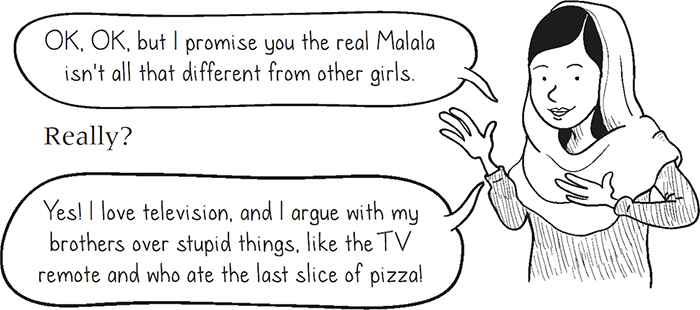
You like pizza?

Hmm, all of that does sound pretty ordinary, actually.
So what makes Malalas story so special? Well, it didnt start with the shooting and the sudden fame. This ordinary girl was destined to achieve extraordinary things from the very moment she was born.
1 N O P ARTY FOR M ALALA
Ziauddin Yousafzai was over the moon. On the hot sticky morning of July 12, 1997 his wife gave birth to their first childa beautiful bouncing baby girl. Over the next few days, he was so excited that he told everyone he met about the new addition to his family. People were polite but confused.

Why was he so happy and proud? After all, his wife had a baby girl. The thing is, in Pakistan, even today, from the second they enter the world, boys and girls are mostly treated very differently. When a baby boy is born, the family celebrates. Guns are fired up into the sky and visitors come to coo over the cradle and cram it with sweets and money. But when a baby girl is born... no gunshots, no giftspeople dont even bother to visit! Instead they sympathize with the poor mother and hope, for her sake, that her next child will be a boy.
Girls play as important a role in Pakistan as they do anywhere else in the world, but some families see raising girls as a financial burden. Girls arent allowed to go out to work and provide for their families like boys do, and it can cost over a million rupees (about $15,000) to marry a daughter off.
Most girls spend their lives at home being wives and mothers, cooking and looking after the house and their children. And for some reason, that doesnt seem as important as earning a regular income. This is the way its been for hundreds of years, which is why Ziauddins celebrating his daughter was so unusual.

HIGH-FLYING ZIAUDDIN
Ziauddin had a habit of challenging tradition that started when he was a boyand brother to five sisters! While he and his older brother went off to school, the girls stayed at home and learned how to run a house, so that when they got married and had families of their own, theyd know what to do. Ziauddin thought this seemed

